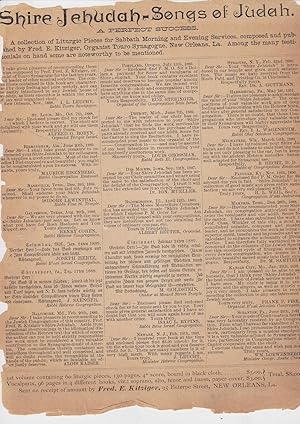Beschreibung
Loose and fragile pages. Parts for Tenor, 2nd tenor, soprano & alto. 1+24+24+24+22 pages. May lack 1st leaf of the Soprano part: Ma Tovu & Lecha Dodi. 2 leaves damaged with text loss. Basso part was owned by one Steiner. Frederick Emil Kitziger 1844¿1903 was a widely known composer of liturgical music for the early Reform movement. He served as organist and musical director for multiple New Orleans-area synagogues in the late 19th century, was prominent on the classical as well as sacred music scenes in New Orleans during the last three decades of the 19th century and contributed significantly to the musical repertoire of the American Reform movement during that same period. He was born in Altenberg, Saxony (Germany), a town near the Czech border, and studied music at the Leipzig Conservatory. In 1865 he immigrated to New Orleans and began his musical life there playing brass in various bands, which he continued to do after his return from a brief trip back to Germany to marry and an ill-fated attempted at farming in Crowley, Louisiana. He became a section leader first in the English-language Grand Opera and, at some point in the 1870s, in the French Opera Orchestra; and the extant evidence suggests that he may have served one or more major churches as organist and choirmaster. Beginning in the 1970s, John H. Baron, a longtime professor of musicology at Tulane University in New Orleans, undertook the first serious examination of Kitziger's life and music, the initial results of which were first published in 1983. This remains the seminal study of the subject, and Baron has continued with subsequent unpublished research and even edited some of Kitziger's music. Kitziger was a non-Jew. Certainly, he does not appear to have identified himself as a Jew in New Orleans, neither religiously nor ethnically, despite his professional as well as personal ties to the Jewish community, a not unusual phenomenon in the social context of New Orleans and other southern cities of that time. Whether he might have had any Jewish ancestry in Germany, including forebears who might have converted to Christianity, remains unknown. He was buried in a nondenominational Christian cemetery, with a cross over his grave and there is no evidence that Kitziger considered himself Jewish. Indeed, Baron refers to him as a Christian. In the introduction to his first volume of published liturgical music (1888) Kitziger indicated that he had been associated with synagogues since about 1868 ("I have been connected for the last twenty years with Jewish houses of worship as organist and musical director"). But apparently, the earliest extant evidence concerning his musical association with synagogues dates no earlier than 1881, when he wrote some music on a professional basis for Touro Synagogue, a merger of two earlier congregations (Gates of Mercy, founded in 1928, and Dispersed of Judah, founded in 1838) which remains New Orleans' oldest synagogue. That same year, he was appointed its organist and music director. In addition to his regular duties in that connection, he continued to write music for its services for additional remuneration. By 1888 he had accumulated a sufficient number of original liturgical pieces to begin publishing them as the four-volume Shire Yehudah¿Songs of Judah: A Collection of Sacred Songs for Soli and Chorus with Organ Accompaniment (1888-1899); and the first volume, Sabbath Morning and Evening Services, was first issued that year. Like most of his contemporaries who composed and arranged music for the American Reform format, Kitziger¿s harmonic language and melodic shapes unapologetically mimics Western hymnody, other Protestant church forms, and classical art music. This reflected the prevailing tastes and expectations of American Reform worshipers as well as rabbis of that period. Bestandsnummer des Verkäufers 005709
Verkäufer kontaktieren
Diesen Artikel melden
Bibliografische Details
Titel: Shire Jehudah - Songs of Judah. A perfect ...
Verlag: Kitziger, Frederick E., New Orleans, Louisiana
Erscheinungsdatum: 1892
Einband: Paper Wrappers
Zustand: Good
Auflage: 2nd Revivsed and augmented edition
![]()




